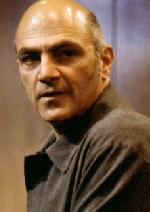SEARCH CurtainUp
REVIEWS
FEATURES
NEWS (Etcetera)
ADDRESS BOOKS
Broadway
Off-Broadway
BOOKS and CDs
OTHER PLACES
Berkshires
London
Los Angeles
Philadelphia
Elsewhere
QUOTES
On TKTS
LETTERS TO EDITOR
FILM
LINKS
MISCELLANEOUS
Free Updates
Masthead
NYC Weather
Cologne, or The Ways Evil Enters the World
By Adrienne Onofri

Tony Abatemarco
(Photo: Carol Rosegg ) |
I'm not dismissing the torment or trauma that gay adolescents endure if they grow up in a family or community unaccepting of homosexuality (which makes strong dramatic fodder). Nor am I ignoring the talent that went into creating this production. But watching it did remind me of numerous similar pieces I've seen (or know about). And while Cologne is told in the third person, not first; has a protagonist from an older generation than many other works in this genre; and has a storyline with details all its own, it's still basically a long monologue about the difficulties of growing up gay. And that's been done many times before on the New York stage.
Tony Abatemarco published Cologne as a short story before adapting it for the stage. In the dramatization, he narrates instead of taking the role of the central character (also named Tony). The script reflects a literary rather than theatrical writing style. While these two things set Cologne apart from most other one-person shows--and many will find Abatemarco's language quite poetic--they're not as effective at engaging the audience: Think of the difference between someone reading a story to you and someone recounting a personal experience. Hearing the story in the third person, we're not privy to some of Tony's feelings--about, for example, the loss of his parents or the somewhat stilted nature of his relationship with his friend's brother, Bobby. Though he's apparently quite taken with the older boy and they tryst on several occasions, their encounters seem dispassionate. Did he wish Bobby could have opened up to him in private even though they were forced to hide their affair in public?
The most dispassionate encounter occurs after Tony has cruelly betrayed Bobby when confronted by violent homophobes. Why it was so important to Tony to be accepted by that gang is not satisfactorily explained. Some other issues raised by the story--such as why Tony became sexually active so young (to fill the void left by absent family members?)--are also ignored. What is the significance of the titular cologne, seen in Tony's hand at the beginning of the play but never after that?
Cologne takes place in the 1960s, culminating in June 1969 with the Stonewall revolt. After the experience with Bobby, Tony had gone away to college full of self-loathing, so Stonewall--beyond its importance to the gay rights movement--offers personal salvation for the young man.
Abatemarco has clearly put his heart into the show. In a brief prologue, he steps out on the stage and smiles at the audience with a look of gratitude and welcome. His performance is smooth and sincere. Lighting on the simple set is gently atmospheric, and music of the day is played at appropriate moments. It's a polished production that many will enjoy. But I didn't find the story or delivery particularly engrossing, or the show overall to be that distinctive from similarly themed plays.
|
COLOGNE, OR THE WAYS EVIL ENTERS THE WORLD Written and performed by Tony Abatemarco Directed by David Schweizer Set Designer: Dan McCleary Lighting: Ed McCarthy Sound Designer: Julie Ferrin Running Time: 90 minutes, no intermission Rattlestick Theatre, 224 Waverly Place, 212- 627-2556 6/07/09-7/29/09; opening 6/11/02 Friday, Sunday & Monday at 8PM, Saturday at 10PM -- $25 Reviewed by Adrienne Onofri, based on June 7, 2002 performance. |

6, 500 Comparative Phrases including 800 Shakespearean Metaphors by CurtainUp's editor.
Click image to buy.
Go here for details and larger image.



